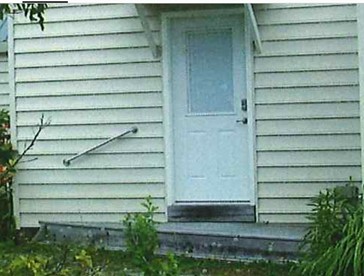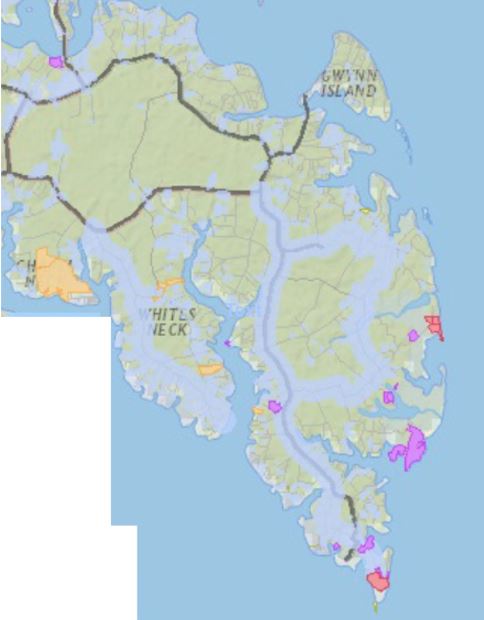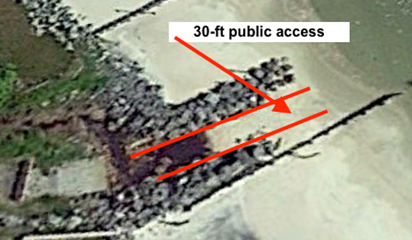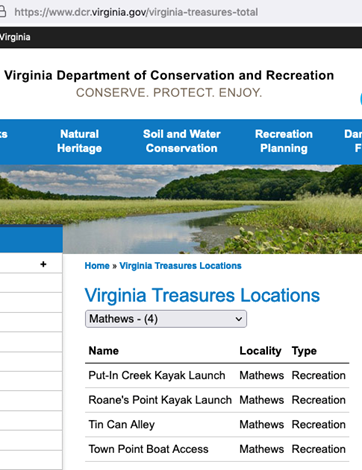During the Bob McDonnell administration, the Commonwealth of Virginia preserved 232,000 acres through conservation easements or donations, falling short of the governor’s 400,000-acre goal because of the tight economy. Seizing on the deficit in his 2013 gubernatorial campaign, Terry McAuliffe promised that he would “preserve at least 400,000 acres of open space.” He repeated the number in his first speech to the General Assembly after taking office in 2014.
By 2015, it became obvious McAuliffe could not meet his goal. Scrambling to save face, he announced in April 2015 the launch of “Virginia Treasures,” a strategy for conserving land and expanding access to public outdoor recreation. The goal was to identify, conserve, and protect at least 1,000 “treasures” by the end of his term.
It soon became apparent to many residents of Mathews County that their property and their homes fell within the pale, blue-coded areas of the map where McAuliffe hoped to find his Virginia Treasures. And so began a seven-year nightmare for the Eubank family as the local government tried to bully them, in what they saw as a grotesque abuse of bureaucratic power, to diminish the value of their private land so that it could be acquired for a public access site.
Two organizations in the Middle Peninsula stood ready to help gather McAuliffe’s treasures. The Middle Peninsula Chesapeake Bay Public Access Authority and the Middle Peninsula Planning District Commission (MPPDC) had been working already on conservation easements and land donations with the goal of providing public access to coastal sites for recreational activities. The MPPDC was the first in the United States to set up a Public Access Authority, which had been created by the General Assembly in 2002.
Mathews County Administrator Mindy Conner (formerly Moran) also served as chairman of the Public Access Authority. Her actions and those of employees under her direction led to a long-running legal wrangle that made its way to the Supreme Court of Virginia. The conflict still has not been definitively resolved.
The story began May 12, 2014, when Candy Eubank arrived at the Gwynns Island property her husband Mark’s parents had purchased in 1972 as a summer home and where his widowed mother Christine Eubank still lived. Candy found survey stakes marked MATHEWS CO. on one side and PRIVATE on the other on the Eubank parcel and the adjacent neighbor’s as well.
The surveyor told her that the stakes, lining an area almost 80 feet wide extending beyond both sides of a discontinued 30-foot-wide Virginia Department of Transportation road, marked the area the county considered public access. Candy called Zoning Director John Shaw, who, according to her records, “agreed at that time, that Mathews did not own anything.” Shaw “took out a sharpie and scratched out MATHEWS CO. from the stakes.”
According to emails turned up by a FOIA request, Shaw communicated with Harrison Bresee, Regional Planner at MPPDC on May 20. In one email, Shaw said, “We acknowledge that there is a 30-foot prescriptive easement from the end of the state maintained road down to the water that provides public access. On either side of the easement, private property is owned down to mean low water.”
Bresee replied, “Sounds good. When would it be convenient for me to come take a look at the Eubank file?”
Despite three FOIA requests and follow up letters from the Eubanks, the county never produced that file.
On June 11, 2014, Christine Eubank gifted her son Mark and wife Candy a deed to the property.
In July Shaw requested the Eubanks send all correspondence to the county to Mindy Moran or Harrison Bresee at the Public Access Authority. Two months later, Moran (now Conner) emailed the first of many threats of legal action. If the Eubanks parked their trailer on the road next to their house where the general public using the beach wanted to park, the county would enforce no-overnight-parking restrictions — even though the county had no parking ordinance in effect in the area.
The zoning office then issued a Notice of violation (NOV) in November to neighbor Edward Cheek on the south side of Route 633. Letters regarding other alleged violations were followed by a criminal complaint from the zoning office on January 26, 2015, but the Commonwealth’s Attorney did not process it.
On March 15, 2015, Moran sent a memo informing the Mathews Board of Supervisors that it would be necessary to purchase “additional adjacent land and beach” to make the 30-foot wide strip of beach known as “Tin Can Alley” at the end of VDOT Route 633 into “a usable public access site.”
The only two adjacent properties belonged to the Eubanks and the Cheeks. Neither was large subdivide to provide public access. Although the county staff never asked, the Eubanks had no interest in selling, so eminent domain would be the only way for the county to gain control of their property. Unlike the Cheeks, the Eubanks were willing to fight the county’s intentions with legal action, but they never imagined it would require going to the Virginia Supreme Court.
In July 2015 county officials alleged zoning and building code violations on the Eubank property, including work supposedly done without permits by the owners of the home before the senior Eubanks bought it in 1972 — and before the Mathews County Zoning Ordinance existed.
On July 27, 2015, 13 days after the first Notice of Violation (NOV) to the Eubanks, Supervisor Janine Burns sent a memo to the state Department of Conservation and Recreation about a public access project the county had just completed in another part of Mathews. She added: “Another opportunity is likely to come before the Board this Fall. I’m optimistic that ‘Tin Can Alley’ will be named a Virginia Treasure so this heritage beach will be protected for further generations.”
“Tin Can Alley” is the area between the red lines in the image below.
FOIA inquiries show the county zoning and building department continued to search for code violations. An October 8, 2015 NOV alleged a four-foot expansion of the Eubank home that never happened.
On December 3, 2015, zoning enforcer Sue Thomas processed four criminal complaints against Mark and Candy Eubanks. According to the Eubanks, a surveyor’s statement showing that the footprint was the same as 1966 in when the house was built wasn’t included in the filing. Instead, the county used a pencil sketch by the Commissioner of Revenue as its basis for the charges. From the beginning, the Eubanks asserted, the sketch was modified to show a 4-foot expansion that never occurred.
After multiple court appearances, continuances and discussions with the Mathews Commonwealth’s Attorney, on July 11, 2016, all four of the county’s criminal charges were dismissed or nol prossed.
But the nightmare was far from over. In August 2016, the Eubanks gave the Zoning staff a survey showing the footprint of the house had not changed from that of 1966 when it was built. Yet in November 8, 2016, zoning director Shaw wrote that the four-foot expansion violation was still pending, and he alleged four new violations.
After a call from John Shaw on December 5, 2016, Eubank sent a letter with a short summary of their conversation in which “John Shaw indicated that the Eubanks needed only to file with the Board of Zoning Appeals a ‘simple’ after-the-fact variance to resolve the issues.”
Shaw retired December 31, 2016, and Thomas Jenkins became zoning director.
The Eubanks’ attorney called Jenkins on January 6, 2017 “to work on a mutually acceptable plan of action relative to any remaining open issues.”
The next response was a February 22, 2017, letter from the county attorney giving a March 10 deadline and a threat of further court action if it was not met. The Eubanks’ attorney again asked for a meeting on February 28 with no response, and once more on March 9th.
April 6, 2017 Jenkins issued four additional NOVs in addition to the one for the non-existent four-foot expansion: adding a second story, enclosing a screened porch, having an unpermitted triangle entrance porch, and enlarging the water-side screened porch encroaching on the RPA. The Eubanks file an appeal with the Board of Zoning Appeals (BZA).
In a June 15, 2017 zoning staff report for the BZA hearing, Jenkins admitted for the first time since the October 2015 NOV that there was no four-foot expansion.
On June 21st, the BZA confirmed two violations, the triangle porch and the screened porch and deck. The Eubanks prepared to file for the after-the-fact variance as recommended by Shaw as a practical way to resolve the last issues.
According to his chronological listing of events, Mark Eubank turned to the FBI office in Richmond in July, filing a criminal complaint for kleptocracy (abuse of power) against Mindy Moran Conner. “Review with a U.S. attorney determines that most likely Virginia State law has been violated,” Eubank noted at the time.
The file was forwarded to Virginia State Police for investigation in mid-October. In notes for a meeting with Virginia State Police November 15, 2017, the Eubanks asked for an investigation. “For more than three years,” they said, “nearly every action or attempt that we (or our lawyers) have made to seek relief regarding the public beach expansion has immediately triggered legal bullying by Mindy Moran in the form of violations from the Mathews zoning office, building official, or both.”
November 21, the Eubanks were served with an injunctive lawsuit to force destruction of the triangle “porch” and screened porch and deck. On December 4, Eubank filed the variance application which was reviewed and accepted with the required fee by Thomas. The next day, she called to say all the required information was in the file, but not in the right place on the application. She told Eubank to set up an appointment with the zoning office secretary for her to work with him to finalize the application. The meeting was set for December 12.
Before that meeting could take place, a VSP Special Agent visited the Mathews Commonwealth’s Attorney. The next day, Dec. 7th, the zoning office canceled the meeting with Thomas.
The following months were consumed by communications and legal filings between the Eubanks and county officials. On February 12, the county attorney returned the variance application to the Eubanks’ lawyer saying that it could not be processed. The Eubanks and their lawyer then submitted a series of FOIA requests for documents which the county withheld. That spring a date was set for a trial regarding the county order for the Eubanks to remove an 8-foot x 26-foot waterside porch, the 8-foot by 18-foot open air deck, and 8-foot by 14-foot triangle “porch,” which functioned as a step for Mark’s 94-year-old mother.

The triangle “porch” in the April 6, 2017 NOV, with a six-inch-high step to allow Mark Eubank’s 94-year-old mother an easier way to enter and leave her home, was torn down after an April 3, 2019, court order.
That May the Eubanks filed malicious prosecution and abuse-of-power actions against zoning director Shaw, zoning compliance officer Thomas, and county administrator/MPPAA Chair Conner. (All have since retired.)
The Mathews Circuit Court ruled against the Eubanks, but the couple appealed to the Virginia Supreme Court. On August 5, 2021, a ruling by Justice Stephen R. McCullough upheld the dismissal of the abuse-of-power charge, but reversed the dismissal of the malicious prosecution charge and sent it back to be heard in Circuit Court.
In that ruling, Justice McCullough wrote:
A plaintiff alleging malicious prosecution must plead and prove by a preponderance of the evidence that the prosecution was (1) malicious, (2) instituted by or with the cooperation of the defendant(s), (3) without probable cause, and (4) terminated in a manner not unfavorable to the plaintiff… The adequacy of the complaint with respect to elements (1), (2), and (4) is not in dispute.
The Justice outlined the Eubanks allegations: that the county employees engaged in a scheme to distort the nature of the encroachment; that the encroachment, although nonconforming, was not actionable at law because it had existed since 1966; that the house was not expanded in 2011 or 2012; that it occupies the same footprint now as it did in 1966, that allegations of a zoning violation were without a factual basis; and that county employees, who wished to increase public access to the water, alleged groundless zoning violations to force the Eubanks to tear down the house so that the property might be acquired via eminent domain at a reduced price.
The Eubanks have requested a jury trial to decide the outcome of the malicious prosecution charge against Conner, Shaw, and Thomas.
“I’m disappointed that we had to appeal to the Supreme Court of Virginia, but pleased with their decision,” said Mark Eubank. “All we ever wanted was a jury trial, and now we’re finally going to get to apply the system that our great country has provided to our personal circumstance.”
The Eubanks believe that Mathews officials plotted the legal vendetta to lower the value and obtain their property by eminent domain to create a public access site. While the case remains unresolved, the 30-foot strip of beach next to their property known as “Tin Can Alley” has been officially registered as one of McAuliffe’s Virginia Treasures.





